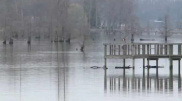Online Chemical Registry Announced For Natural Gas Extraction
As activist groups across the country protest methods of natural gas extraction, an online registry of chemicals used in hydraulic fracturing has been set for launch.
Announced on April 11, 2011, FracFocus.org will allow the public to look up chemicals used in the extraction of natural gas from local wells, reports ABC News.
Kathryn Klaber, president of the industry group, Marcellus Shale Coalition, told the Scranton Times Tribune that it should increase awareness in communities near natural gas wells.
"This online database should also bring closure to the question of what and how many additives are used in the fracturing process," she said.
The online chemical disclosure registry is a joint project of two U.S. government organizations: the Ground Water Protection Council and the Interstate Oil and Gas Compact Commission. It says it will also provide introductory information on the extraction process and how it pollutes ground water.
“Our intention is to provide the public with objective information on hydraulic fracturing, the chemicals used, the purposes they serve and the means by which groundwater is protected,” the website states.
Hydraulic fracturing, or “fracking,” is a method of drilling with a mixture of water, sand and chemicals to tap natural gas reserves trapped in rock formations underground. The chemicals used can seep into the environment, contaminating surrounding ground water.
The chemical cocktail is unique in every fracking job depending on the geological formations, making health risks different from well to well. A registry would clarify each well’s unique formation.
FracFocus.org users will be able to search for information on local wells, including a list of chemicals used, as provided by the chemical suppliers on Material Safety Data Sheets. The site also provides links to drilling regulations state by state.
However, information on some chemicals considered trade secrets will not be disclosed, according to ABC News.
As the Energy Policy Act of 2005 exempts chemicals used in fracking from federal oversight, the registry can be seen as a step forward regarding government transparency.
Some remain sceptical of the site's effectiveness. Jill Morrison of Powder River Basin Resource Council, a landowners group, told The Casper Star-Tribune that the launch of the site will stall efforts to change the industry's habits.
“Our concern is that just focusing on disclosure allows the real issue of requiring prevention of contamination or harm to slip through the cracks and be ignored,” he said. “If we focus our attention solely on disclosure, we are diverted from the real issue of protection from contamination.”
Many others across the country are similarly concerned and are protesting to protect ground water from fracking chemicals.
According to the Associated Press, protesters gathered in Albany, N.Y. on April 11 to urge state lawmakers to protect against chemicals used in the Marcellus shale drilling, a natural gas reserve that stretches across parts of New York, Pennsylvania, Ohio and West Virginia.
Residents in South Gate, Texas posted signs bearing the slogan “get the frack out of here” to protest against local fracking, claiming the city has not upheld ordinances for drilling regulations protecting public health, reports the Star-Telegram.
“It’s meant to be a wakeup call,” resident Michael Greyson told Fox News, referring to the provocative signs. “We don’t need to risk the health of our kids, the safety of our community.”





